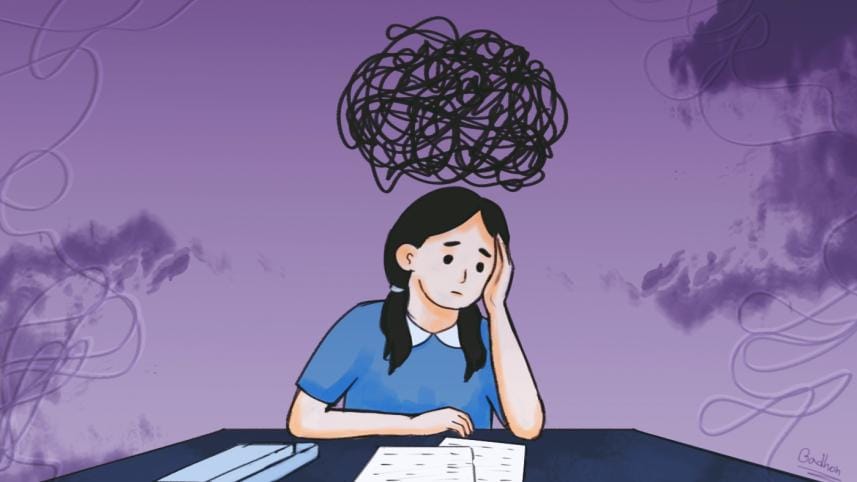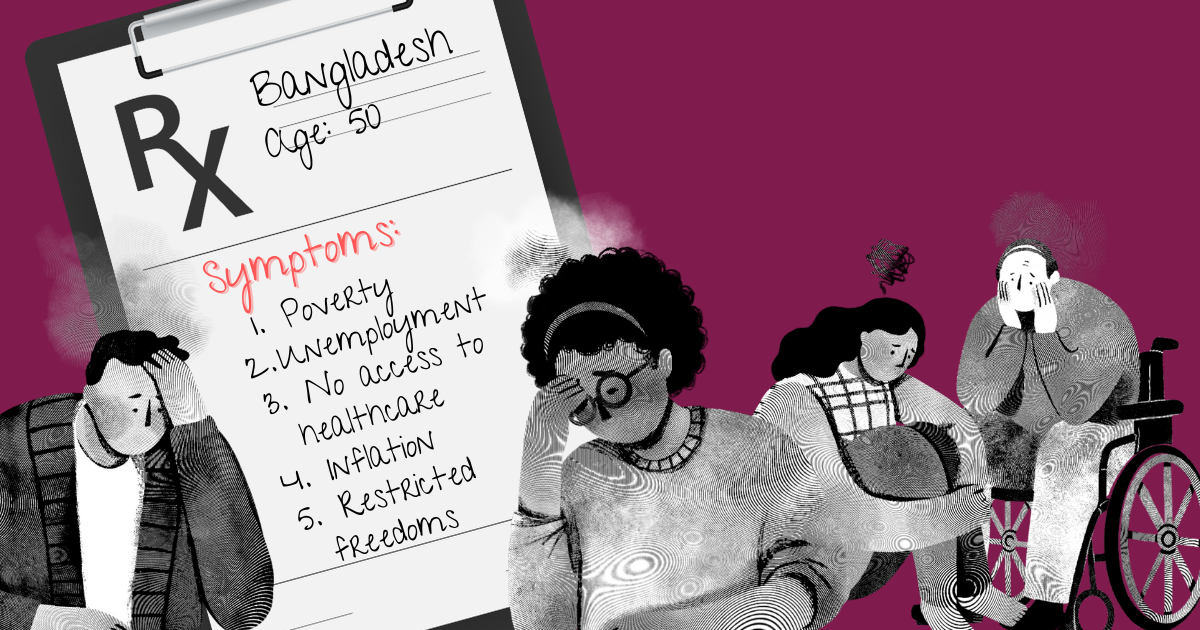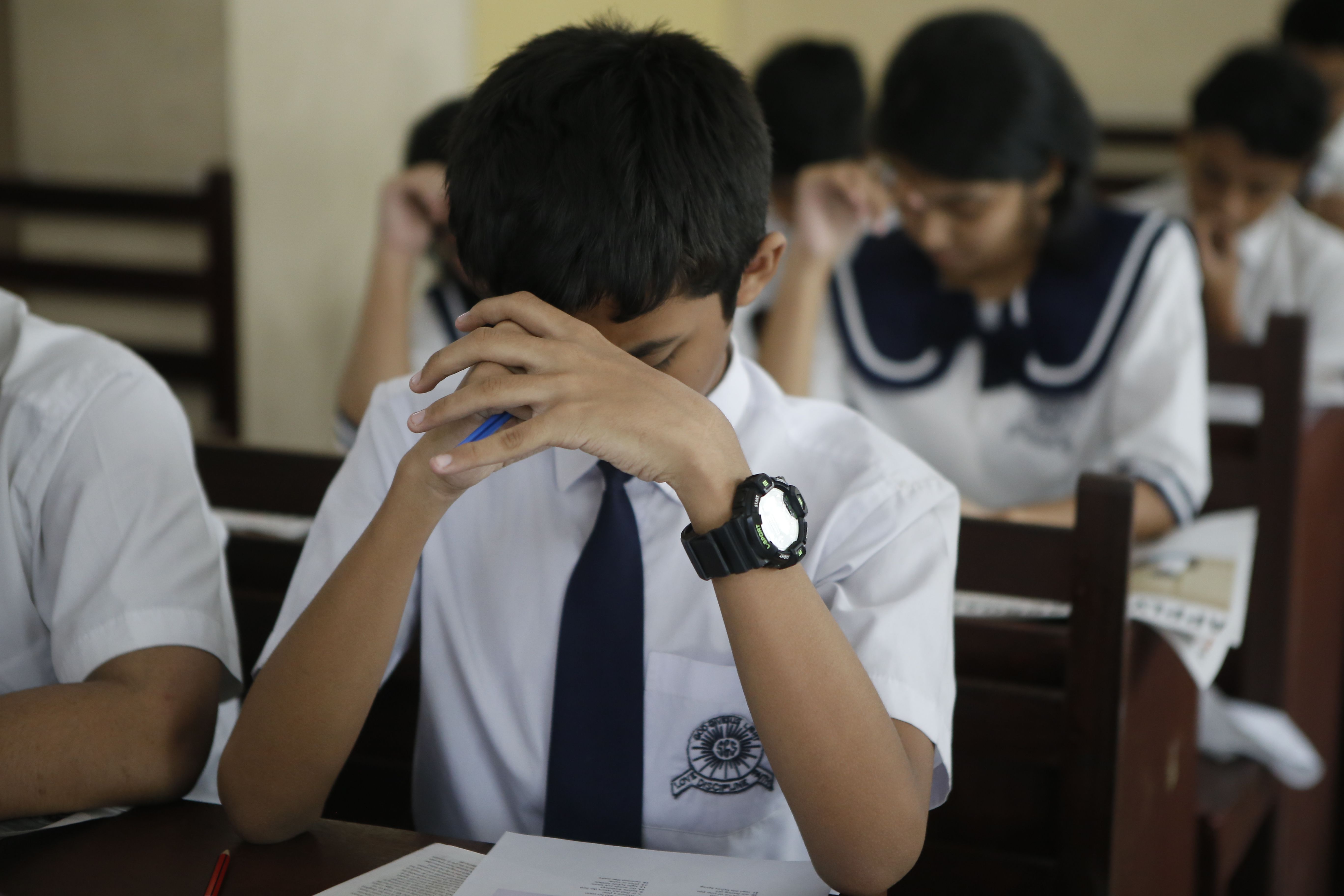Troubled: Mental health challenges of our school children

When Ms Matin saw Mamun after a decade since his kindergarten years, she was appalled. The child she knew was happy and energetic: what became of him in his adolescent years? Mamun looked frail, lacked energy, and had a distant and troubled expression on his face. His father recounted how Mamun had withdrawn from his friends and social activities, had difficulty concentrating on studies, and suffered bouts of headaches and other ailments that did not respond well to treatment. His friends seemed to have abandoned him and his teachers left him alone, whispering among themselves about this strange and alien being. Here was an adolescent child drifting away, far from friendly shores, alone and helpless.
Mamun's mental health situation is not uncommon and probably reaching contagion proportions in schools worldwide. In Bangladesh, the subject is taboo. Lack of understanding, fear, and social stigma often prevent school children and their families from seeking timely help. This exacerbates the child's difficulties and hinders her/his overall well-being. Unfortunately, a child like Mamun is often told, "get over it" or "it's all in your head." The problem gets quickly swept under the rug with its attendant burdens and severe consequences.
Troubled school children suffer mental stresses for a variety of reasons: The competitive education system, family and societal expectations, emphasis on academic success over learning, authoritarian teachers, and insensitive peers who make life miserable. Many children find themselves struggling with high academic standards without guidance or support, abused by the acerbic tongue of some teachers, and being bullied day in day out by peers. It's a rough world for the throbbing little hearts, yearning to be free like the butterfly; yet being battered constantly by the whirlwinds of family, teachers, and peers.
Sources of mental challenges
Family dynamics and expectations are the starting point of the travails of many children. High expectations, strict parenting styles, pressures to conform to societal norms, and career aspirations deemed prestigious or financially rewarding begin to build pressure at home with crushing force. Some children find their achievements constantly compared with the children of other family members, friends, or peers. Constant criticism or disapproval when the child is unable to perform leaves her/his self-esteem in tatters and contributes to feelings of rejection. Families also have specific expectations for how boys and girls should behave and what career paths they should pursue even if their abilities and interests are at cross-purposes. Beyond academics, families may also expect their children to excel in extracurricular activities such as sports, arts, or music. In some families, the emphasis on success is so high—to claim "first boy" status—that "second boy" is not acceptable! Expressing vulnerability, seeking emotional support, or even giving up under the circumstances is not an option and severely discouraged. The constant demands of family expectations can significantly impact, even cripple, the mental health of school children, sometimes leading to suicidal inclinations.
Parents must understand the weight of their words on their children and take a balanced approach to academics, emphasising individual growth over strict achievement targets. They must learn to open up communications channels to understand the academic challenges of their children and engage in open discussions about career aspirations in a supportive environment. When they begin to appreciate the uniqueness of each child and their individual strengths, abandoning comparisons and providing a supportive environment where even small achievements are celebrated, it is a win-win situation. Encouraging their progeny to learn from mistakes as a natural part of development can also help raise a child's self-worth and create conditions for a healthy mind to evolve.
Teachers can also trigger mental health breakdowns, knowingly or unknowingly, that significantly impacts school students. While a great number of teachers are devoted to fostering a positive learning environment, some of them stand out for their abysmal and erroneous demands in the classroom that include excessive demands to perform, frequent testing, and creating intense competition among peers to create a high-stress environment. A rigid teaching style that doesn't appreciate or accommodate alternative learning styles may also lead to frustration and a feeling of inadequacy among many learners who learn differently. Placing them in "learning cages" with no manoeuvrability is simply inappropriate.
Then there are teachers who do not hesitate to utter biting comments, express constant criticism, or display dismissive behaviour that affect a student's self-esteem and confidence. Mistakes of students are sometimes rebuked with ill temper instead of using positive communication, constructive feedback, and encouragement. Some teachers are prone to treating mistakes as opportunities to punish learners—a dreaded classroom environment. Favouritism is also a trait some teachers exhibit openly; those in disfavour experience sour behaviour and unfair treatment. Unrealistic expectations of teachers regarding classroom behaviour, performance, or conformity may similarly lead to stress and anxiety. These teachers need training to be sensitive or identify signs of mental health challenges of the young learners.
It is important for teachers to focus on holistic learning and individual progress in a collaborative and supportive learning environment where teaching methods cater to different learning styles. Teachers must also encourage open communication and be receptive to students' concerns by cultivating positive and two-way communication, providing constructive feedback, and offering encouragement. These traits are not necessarily inborn; they must be nurtured. Teachers receiving mental health awareness training must also develop adequate skills to recognise signs of distress to assist and guide young learners or refer them to appropriate support services.
Peers are an additional source of severe mental stress, especially when students are exposed to bullying which is manifested in a variety of ways. Verbal bullying involves using words to hurt, threaten, or manipulate another person. This can include name-calling, teasing, taunting, and spreading rumours that can induce low self-esteem, anxiety, depression, and a sense of powerlessness in the victim.
Physical bullying involves the use of physical force to harm another person. This may include hitting, kicking, pushing, or any form of physical aggression that may result not only in physical injuries but also emotional trauma.
Social bullying involves manipulating social relationships to harm, control, or exclude someone. This can include spreading rumours, gossiping, or intentionally excluding individuals from social groups that create feelings of isolation, loneliness, and rejection.
Another hurtful practice is prejudice-based bullying which involves targeting individuals based on their race, ethnicity, religion, gender identity, physical handicap, or even a spoken dialect that is perceived as different. Such practices are manifested in discriminatory behaviour, hate speech, or exclusion.
Sexual bullying involves inappropriate comments, gestures, or actions of a sexual nature. This can include sexual harassment, inappropriate touching, or making explicit remarks, resulting sometimes in post-traumatic stress disorder (PTSD) for which victims may struggle with issues related to body image and self-worth. When teachers engage in sexual bullying, that should call for immediate termination.
Of late cyberbullying has emerged through social media, messaging apps, and online forums. These digital platforms are used to harass, embarrass, or intimidate others. It's important to note that the various forms of bullying are often interconnected, and an individual may experience multiple types of bullying simultaneously.
Educational reforms are being introduced in several South Asian countries to alleviate the mental abuse of school children. Some initiatives include curriculum revisions to promote holistic learning, integrating mental health education into the curriculum, and introducing counselling services within schools to provide emotional support to students.
Important interventions
When children feel compelled to fulfil their family's career expectations, it can lead to a sense of inadequacy or dissatisfaction if their own interests and passions are compromised. Family counselling programmes and workshops are thus vital to help parents understand the impact of their expectations on children's mental health. Parental education programmes must emphasise the importance of a balanced approach, fostering positive communication within the family, and supporting children's emotional well-being.
Professional development opportunities for teachers include learning to use varied teaching methods and to be flexible and adaptable in instructional approaches that promote the importance of learning (not regurgitating) and emotional intelligence. They must also be trained to encourage open communication and empathy. Teachers who employ negative reinforcement, criticism, or an authoritarian approach must receive special training to change the uncomfortable and anxiety-inducing classroom atmosphere they create and to encourage a supportive and respectful classroom culture where students feel safe and encouraged to express themselves.
It is also important to introduce recognition programmes, positive feedback, and two-way communication. Cultivating a culture of appreciation and involvement with the school community can go far in building an exemplary learning environment that recognises and respects mental health issues.
Schools and affiliated communities can prevent bullying by fostering a culture of empathy, promoting awareness, and implementing anti-bullying policies and counselling interventions for both victims and perpetrators. Early identification and appropriate intervention are key to mitigating the long-term mental health effects of bullying on school children.
Educational initiatives must also be designed to foster togetherness and empathy among students by creating a more inclusive and supportive school environment. Such an environment conveys the language of fellow-feeling and love every beating heart understands, empathy connects each soul, and inclusiveness is the playground where the children can flourish in camaraderie, team spirit, and mutual respect. Let the processes begin—now!
Dr Syed Saad Andaleeb is distinguished professor emeritus at Pennsylvania State University and former vice-chancellor of BRAC University. This article was adapted from an earlier version written for a school newsletter.
Views expressed in this article are the author's own.
Follow The Daily Star Opinion on Facebook for the latest opinions, commentaries and analyses by experts and professionals. To contribute your article or letter to The Daily Star Opinion, see our guidelines for submission.




 For all latest news, follow The Daily Star's Google News channel.
For all latest news, follow The Daily Star's Google News channel. 



Comments